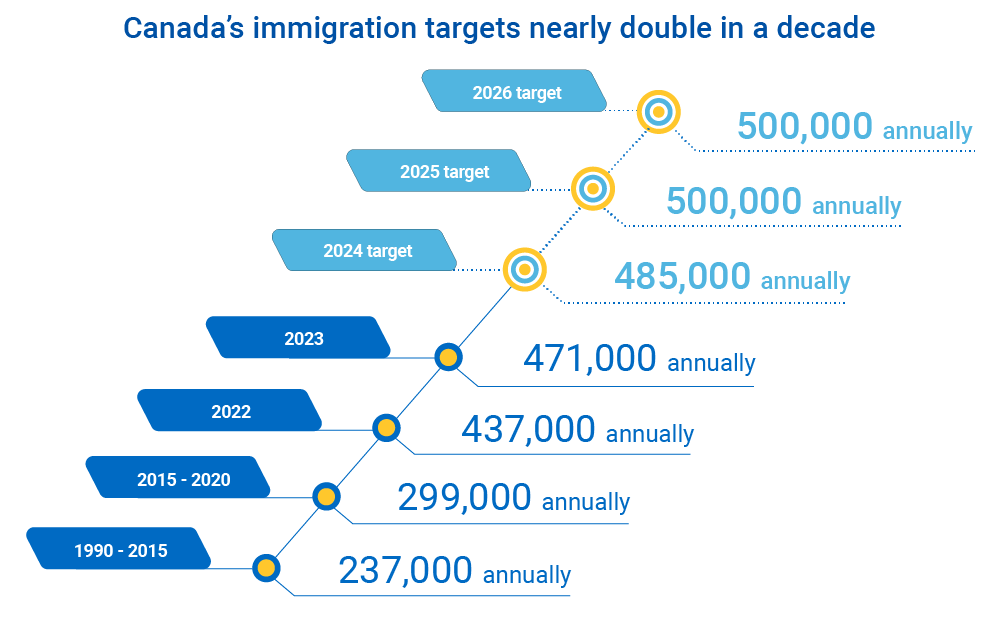Immigration in Canada has accounted for all the growth in the labour force for well over a decade, but it’s still not enough to significantly offset the impact of an aging demographic or substantially reduce the structural shortages in the jobs market, says a report by RBC Economics.”
A big reason for this is that the skill sets that many immigrants bring to Canada and the study fields of international students do not match well with the anticipated longer-term structural needs of the economy. This impairs the prospects for newcomers and, more broadly, the economy,” it said.
“Right now, the immigration system may be focusing too much on the labour market’s short-term demands, filling holes in sectors where low-skilled occupations have been experiencing acute shortages since the pandemic.
“This has led to a surge in non-permanent residents, a strain on housing and social services, and eroded public support for immigration.
“The federal government needs to update immigration policies to focus more strategically on immigrant outcomes and the long-term structural needs of the labour market, while keeping in mind the infrastructure capacity to accommodate newcomers. Addressing this will be key to maintaining economic prosperity over the long run, and Canada’s high quality of life.”
The RBC highlighted the following as important to consider:
- Expanding immigration targets to address an aging demographic and meet short-term labour market needs has led to a widening gap between workers’ skills and the abilities needed to address long-term structural labour shortages;
- Employment from temporary work permit holders including international students is concentrated in sectors with low-skilled occupations, which reduces the incentive for businesses to innovate and invest in labour-augmenting or -saving technology;
- Canada’s two-step pathway to apply for permanent residency needs greater oversight to ensure the system isn’t being abused by educational institutions and applicants;
- The stress on infrastructure and social services needs to be addressed to improve economic outcomes for immigrants and their surrounding communities;
- Canada’s Comprehensive Ranking System needs to be updated to prioritize economic immigrants with higher predicted earnings.

“A series of changes and updates have been announced by the federal government in an attempt to reel in a ballooning non-permanent resident population and regain greater oversight into newcomers entering the labour market,” said RBC.
In January, the federal government implemented a cap on the total study permits to be issued over two years—limiting it to 364,000—roughly half the number of permits issued in 2023.
“The government also implemented stricter financial requirements for foreign students applying, upping the minimum capital requirement from $10,000 to more than $20,000 to ensure students have enough of a cushion to support their needs while studying. Work visas for spouses of undergraduate international students will also no longer be issued, and students studying at private colleges will no longer be eligible for the PGWP in an attempt to address potential loopholes in the system.
“However, the government will have to go beyond these initial steps to update the immigration system in order to ensure both the economy and newcomers can once again prosper from the benefits of immigration.
“Policymakers should examine other streams of non-permanent residents—like the Temporary Foreign Worker and International Mobility Programs—where numbers have also ballooned. They must address housing shortages on and surrounding campuses and update the selection process for permanent residents by streamlining the number of pathways available to prioritize candidates with the highest predicted earnings.”
Here are recommendations from RBC that could help keep the immigration system on track to meet the country’s needs:
- Update the Comprehensive Ranking System (CRS) to prioritize economic immigrants with higher predicted earnings;
- Afford international students more work opportunities, especially in their fields of study;
- Drive foreign recruitment campaigns;
- Incentivize post-secondary institutions to build more student housing;
- Address funding frameworks for post-secondary institutions; and
- Consider mutual credential recognition agreements with prominent source countries.

Mario Toneguzzi
Mario Toneguzzi is Managing Editor of Canada’s Podcast. He has more than 40 years of experience as a daily newspaper writer, columnist, and editor. He was named in 2021 as one of the Top 10 Business Journalists in the World by PR News – the only Canadian to make the list. He was also named by RETHINK to its global list of Top Retail Experts 2024.
About Us
Canada’s Podcast is the number one podcast in Canada for entrepreneurs and business owners. Established in 2016, the podcast network has interviewed over 600 Canadian entrepreneurs from coast-to-coast.
With hosts in each province, entrepreneurs have a local and national format to tell their stories, talk about their journey and provide inspiration for anyone starting their entrepreneurial journey and well- established founders.
The commitment to a grass roots approach has built a loyal audience on all our social channels and YouTube – 500,000+ lifetime YouTube views, 200,000 + audio downloads, 35,000 + average monthly social impressions, 10,000 + engaged social followers and 35,000 newsletter subscribers. Canada’s Podcast is proud to provide a local, national and international presence for Canadian entrepreneurs to build their brand and tell their story.





